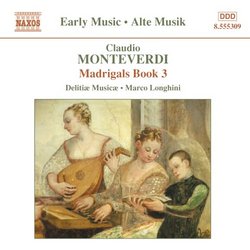| All Artists: Claudio Monteverdi, Marco Longhini, Delitiae Musicae Title: Monteverdi: Madrigals Book 3 Members Wishing: 0 Total Copies: 0 Label: Naxos Release Date: 2/17/2004 Genre: Classical Styles: Opera & Classical Vocal, Historical Periods, Baroque (c.1600-1750), Early Music Number of Discs: 1 SwapaCD Credits: 1 UPC: 747313530922 |
Search - Claudio Monteverdi, Marco Longhini, Delitiae Musicae :: Monteverdi: Madrigals Book 3
 | Claudio Monteverdi, Marco Longhini, Delitiae Musicae Monteverdi: Madrigals Book 3 Genre: Classical
|
Larger Image |
CD Details |
CD ReviewsThe Goal of Historically Informed Performance Practices... Giordano Bruno | Wherever I am, I am. | 09/02/2008 (3 out of 5 stars) "...is not pedantry or purity or some ineluctable authenticity. The goal is to make better music, to offer a more thrilling performance. This recording by Delitiae Musicae is not very old; it was made in 2002. It comes therefore as one of many recordings of Monteverdi's third book of madrigals, and to my ears it is nowhere near the top of the list of choices. The raison d'etre for it seems to be the use of a consort of all male voices, with countertenors Alessandro Carmignani and Fabian Schifrin carrying the cantus and quintus parts. I've argued quite often for the use of male sopranos and altos in Renaissance polyphony, and I've expressed great admiration particularly for the Orlando Consort's recordings of Franco-Flemish polyphony. Monteverdi and the other madrigalists of Mantua and Ferrara in the late 16th C wrote in a different musical ambience and a very different affective style. Public performances by very skilled women singers were common, and it seems mere self-justification to claim, as Delitiae does, that performance by women in churches was still prohibited. It's a non sequitur to claim that all-male consorts would have been preferred in secular settings also.
The two countertenors here, I have to say, are quite skilled at what they do, but they sound forced and inexpressive on these perfervid amorous wonders called madrigals. I question whether their voice qualities would have appealed to Mantuan audiences. It seems plausible that "natural" male altos and sopranos, as well as skilled boy singers of 17-18 whose voices hadn't yet changed might have been available in that era, when madrigals were "the only game in town" for singers. The performances I recommend for these and all madrigals of the Monteverdi era are those of La Venexiana and of Anthony Rooley with Emma Kirkby. The former are quite recent, the latter decades old, but both use very skilled female sopranos singing the cantus lines. PS: I forgot to mention the recordings of these madrigals by Rinaldo Alessandrini and Concerto Italiano, also available and very well done." |

 Track Listings (20) - Disc #1
Track Listings (20) - Disc #1